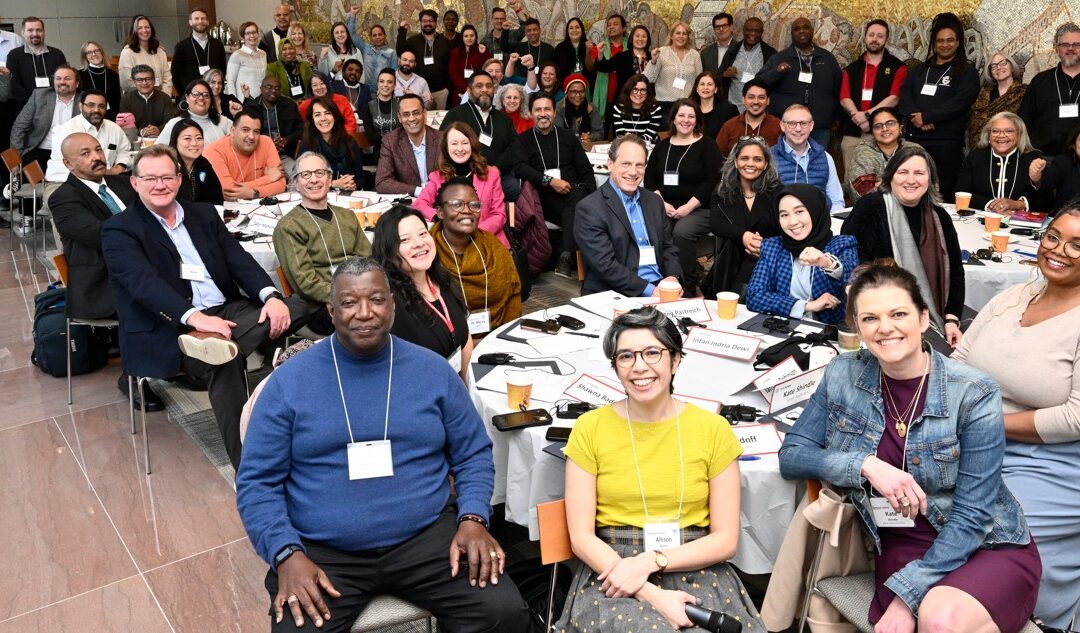
Feb 16, 2024
- Dozens of union leaders from around the world who are working to advance democracy in communities and workplaces convened last week in Washington, D.C., to discuss the essential role of unions in leading social change and addressing multiple global crises, including strengthening democracy through the exercise and advancement of worker rights.
As part of the Global Labor Leadership Initiative (GLLI), a Solidarity Center partnership with the Worker Institute at Cornell, 22 union leaders and allies from 17 countries spent two days discussing movement building, the platform economy and strategies to tackle in-country and mutual challenges affecting working people, often in the face of brutal conditions. They then joined more than 70 U.S. and Canadian labor and justice leaders for a two-day event, “Meeting the Moment: How Can Unions Maximize Impact and Power in a Time of Increasing Polarization and Change?” where they shared strategies on how unions can step up efforts to defend and promote worker rights.
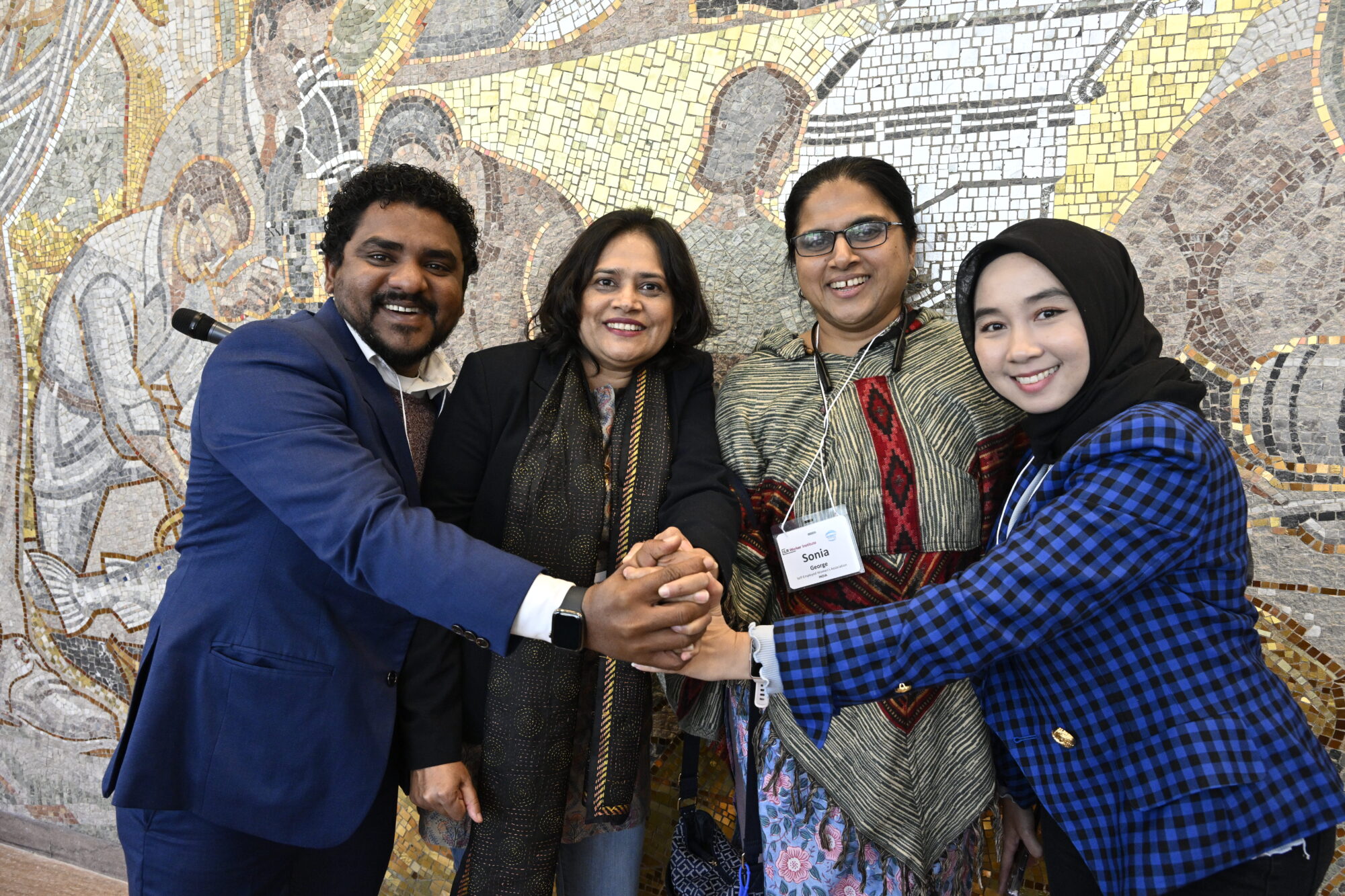
Global Labor Leadership Initiative (GLLI) participants Mauroof Zakir, Tourism Employees Association of Maldives (TEAM) General Secretary and Maldives Trade Union Council President; Nazma Akter, Sommilito Garments Sramik Federation (SGSF) President and founder (Bangladesh); Sonia George, Self-Employed Women’s Association (SEWA) General Secretary; and Intan Indria Dewi, SPN (garment and textile trade union federation) Banten Provincial Chairperson (Indonesia). Photo: Kaveh Sardari
“Democracy exists [only] where workers can be heard,” said Maicon Michel Vasconcelos da Silva, who spoke at the panel event and who serves as secretary of international relations of the Brazil National Confederation of Metalworkers (CNM).
Overwhelming evidence shows that democracy begins at work—in particular, where independent unions provide individuals with the opportunity to elect and be leaders, and join in common cause for better wages, benefits and working hours. Organized labor also holds politicians accountable. In recent years, labor lawyers pushed for justice following Brazil’s deadliest—and entirely preventable—mining disaster. An aviation union in Ukraine exposed rampant corruption in the terminal. And in Colombia, the labor movement shut down the country’s largest port to reach a landmark agreement from the government to live up to its promises to invest in a long-neglected and majority Black city.
Meanwhile, democracy enables workers and their unions to flourish and, as it is increasingly threatened around the world, democracy also depends on working people and their organizations to keep it resilient, said panel speakers and participants, emphasizing unions’ unique role and capacity to push back on unjust and undemocratic forces.
“Unionism and unionizing should really put all of its energy behind democracy,” said Sergio Guerrero in a separate interview. Guerrero, a platform worker in Mexico and general secretary of the National Union of Workers by Application (UNTA), added: “We can’t have a democratic society without unionized workers.”
Yet across every region of the world, “the global cost-of living crisis has been met with a crackdown on the rights of working people,” according to the 2023 International Trade Union Confederation (ITUC) Global Rights Index.”
“Organizing on issues of democracy, of human rights, of preservation of democratic procedure is something I think is essential for us as a union,” said Čedanka Andrić, president of the Serbia Trade Union Confederation Nezavisnost (Independence), who spoke to the Solidarity Center between sessions.
A key takeaway, said many participants, is that democracy cannot be taken for granted.
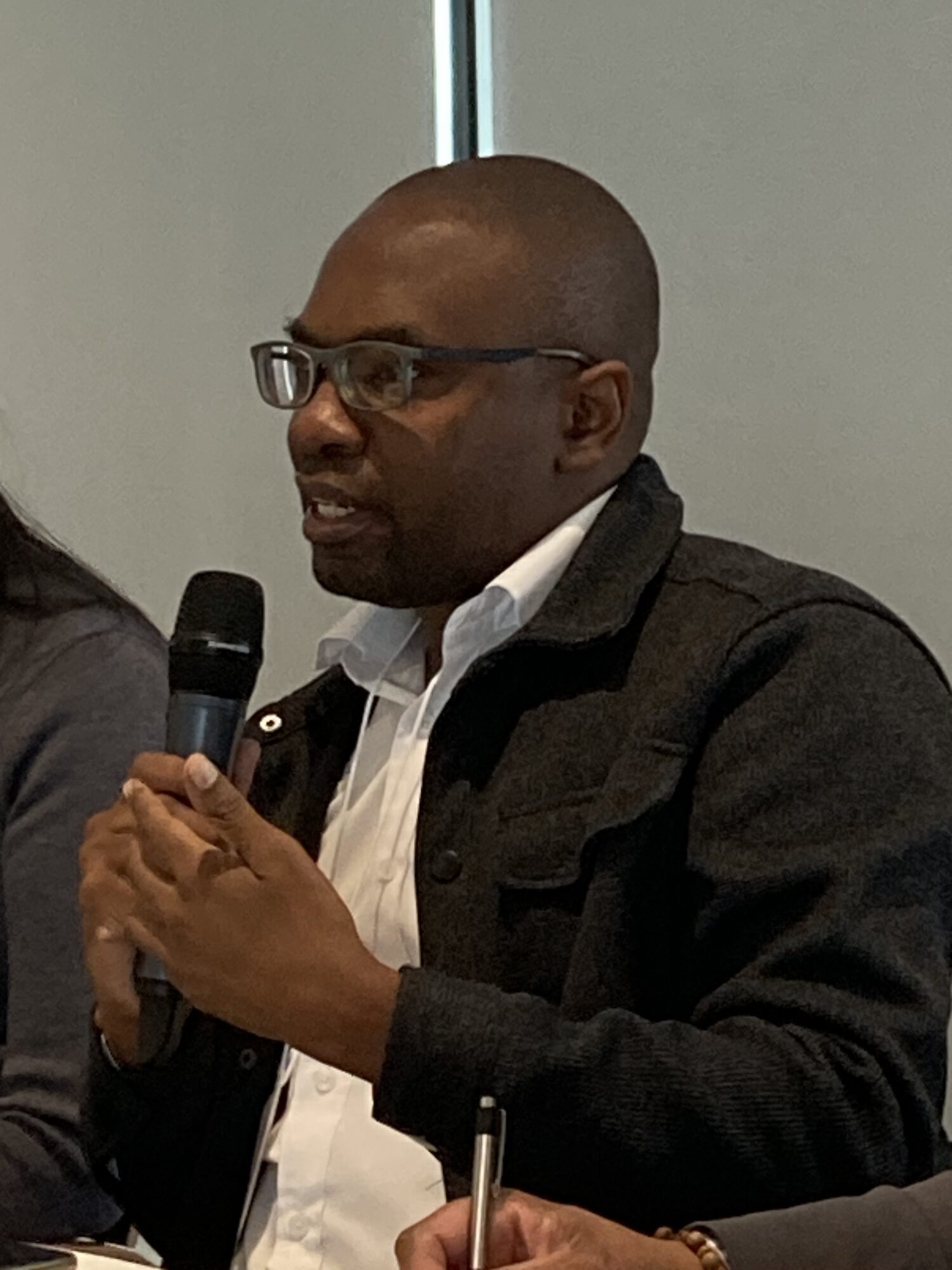
“No one is insulated from dictatorship. No one is safe,” said Peter Mutasa, who had to flee for his life following a violent crackdown on Zimbabwe unions. Photo: Kaveh Sardari
“We learned that the rights won by those who fought before us are transient,” warned Peter Mutasa, chair of the Crisis in Zimbabwe Coalition. Mutasa, former president of the Zimbabwe Congress of Trade Unions (ZCTU), had to flee for his life in 2020 following a violent crackdown on Zimbabwe unions and their leaders that began in 2018.
“No one is insulated from dictatorship. No one is safe,” he said.
The panel event concluded the 2024 GLLI convening. Organized by the Solidarity Center in coordination with Cornell’s ILR Worker Institute, GLLI provides participants with solidarity and skills-building opportunities so they can help build a dynamic, powerful and inclusive labor movement that can transform society and the economy so that it works for workers.
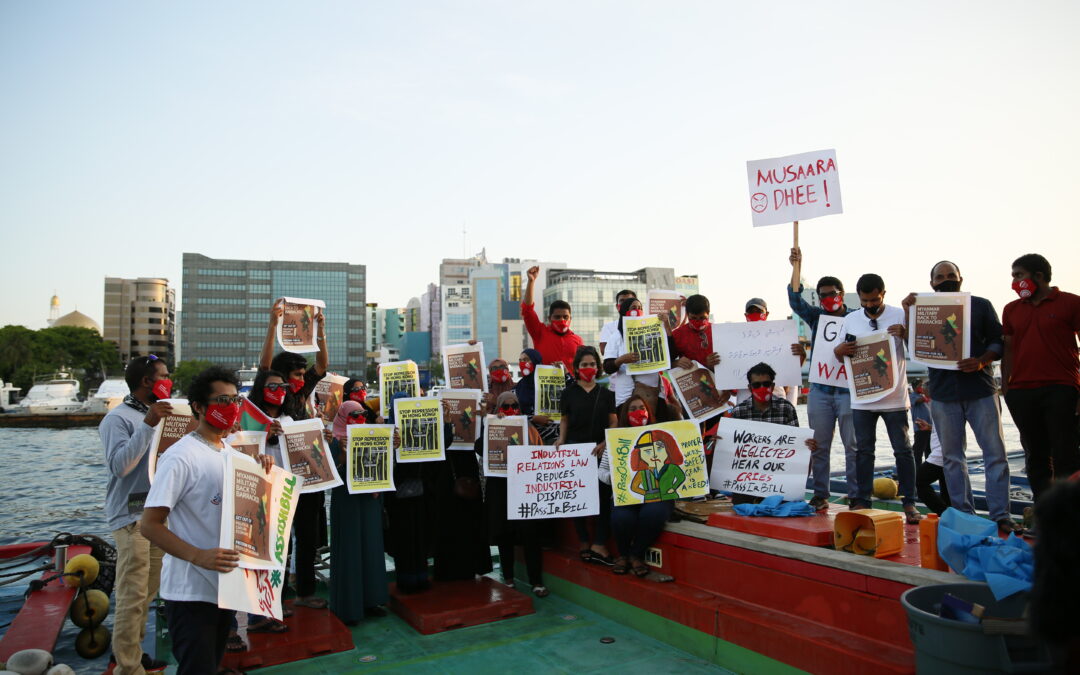
Jan 5, 2024
After a decade of relentless advocacy by the trade unions in the Maldives, President Mohamed Muizzu ratified on January 2 the Industrial Relations and Occupational Safety and Health bills passed by parliament with a super majority in mid December. Enactment of the law marks a monumental stride toward safeguarding worker rights and fostering industrial harmony in the Asian archipelago.
The Industrial Relations Act solidifies a structured framework for consultation and social dialogue among government entities, workers and employers. This framework stands as a beacon for the protection of worker rights, paving the way for economic and social progress, unions say. At its core lies the establishment of the National Tripartite Labor Advisory Council, ensuring the protection of collective bargaining rights and robust mechanisms for resolving industrial disputes through mediation. The Act institutionalizes key worker rights, like the rights to freedom of association and assembly, and empowers both local and migrant workers to collectively negotiate for their interests and welfare.
Simultaneously, the Occupational Safety and Health bill underscores stringent obligations for employers, emphasizing workplace safety standards, compensation frameworks and penalties for non-compliance. This legislation reflects a firm commitment to international standards and fundamental human rights, ensuring a safer and healthier work environment for all.
Congratulating the trade union movement of the Maldives on this crucial victory, Mauroof Zakir, president of Maldives Trade Union Congress (MTUC), said the passage of both bills “represents a historic victory for the working class in the Maldives. It is indeed a great achievement to empower workers and contribute to strengthening the democratic principles of the nation.”
On a similar note, Fathimath Zimna, MTUC general secretary, said, “Enactment of Industrial Relations Act and Occupational Safety and Health Act marks a significant milestone and victory that was achieved through a relentless campaign by Maldives unions. It is an important stride forward in achieving the decent work agenda in the Maldives. The journey of unions and workers will stand as a symbol of resilience and strength to working people of the world. It resembles what working people can achieve through collective voice. It is important for workers to organize into unions and raise their voices collectively to protect workers’ interests to fully entertain the rights given by the two acts.” She added that, “It is just the beginning for many more victories for the working people and their families. We would like to extend our appreciation and gratitude to all our partner organizations, including Solidarity Center and the global union federations for their support and solidarity.”
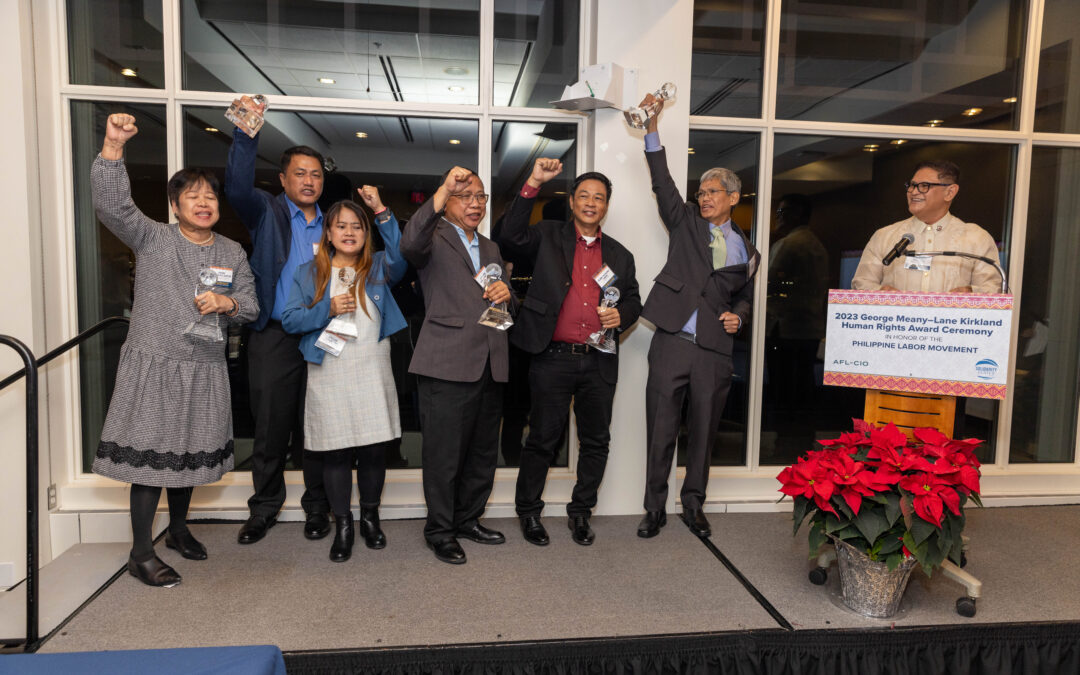
Dec 8, 2023
For their courage and persistence in the face of escalating threats to their own lives, seven delegates representing the Philippine labor movement received the 2023 AFL-CIO George Meany-Lane Kirkland Human Rights Award in a ceremony in Washington, D.C., this week. The award is given annually in recognition of dedication to and effectiveness in highlighting the widespread denial of fundamental human rights at work and in society.
“This award is in recognition of the Philippines labor movement’s resilience, persistence and courage in the face of extreme violence and repression,” said AFL-CIO President Liz Shuler at the event.
More than 70 union members have been killed since 2016, and many more are victims of red-tagging (branding and accusing individuals and/or organizations of being terrorists), illegal firing of union activists and anti-terrorism laws directed at stifling freedom to form unions and bargain.
“The killings are precisely designed to sow fear among workers,” United and Progressive Workers Center (SENTRO) Secretary General Josua Mata told the Solidarity Center.
Persecution has not stopped despite recent changes to the government’s top leadership. Union leader Jude Thaddeus Fernandez, 67, was killed September 29 after a division of the Philippine National Police reportedly entered Fernandez’s home and shot him dead. The murder of Alex Dolorosa—whose role as a union organizer and a paralegal was funded by the Communications Workers of America (CWA)—in April remains uninvestigated like every other extrajudicial killing of a trade unionist in the country.
Workers who are organizing and conducting other union business in the Philippines seek only to build a decent society and life for their families, Trade Union Congress of the Philippines (TUCP) Vice President Luis Corral told the Solidarity Center.
“We are not the enemy,” he said.
In addition to Corral and Mata, the delegation receiving the award for include Alliance of Concerned Teachers (ACT) Secretary General Raymond Basilio; Business Process Outsourcing Industry Employees Network (BIEN) President Mylene Cabalona; Public Services Labor Independent Confederation (PSLINK) President Annie Enriquez Geron; Kilusang Mayo Uno (KMU) Chairman Elmer Labog; and Federation of Free Workers (FFW) President Sonny Matula. The Solidarity Center has a 25-year partnership with the Philippine labor movement, including current support for an organizing campaign for low wage, app-based food delivery workers.
“This recognition fortifies our resolve and validates our efforts under the most challenging of circumstances,” said TUCP President and Philippine Congress House Deputy Speaker Raymond Mendoza when accepting the award, “on behalf of all workers in the Philippines, especially those who gave their lives for labor.”
Previous award recipients include United Nations Special Rapporteur on the rights to freedom of peaceful assembly and of association Maina Kiai and the Tunisian General Labor Union (Union Générale Tunisienne du Travail, UGTT), which also won a shared Nobel Peace Prize for its role in brokering Tunisia’s path to democracy during the Arab uprisings.
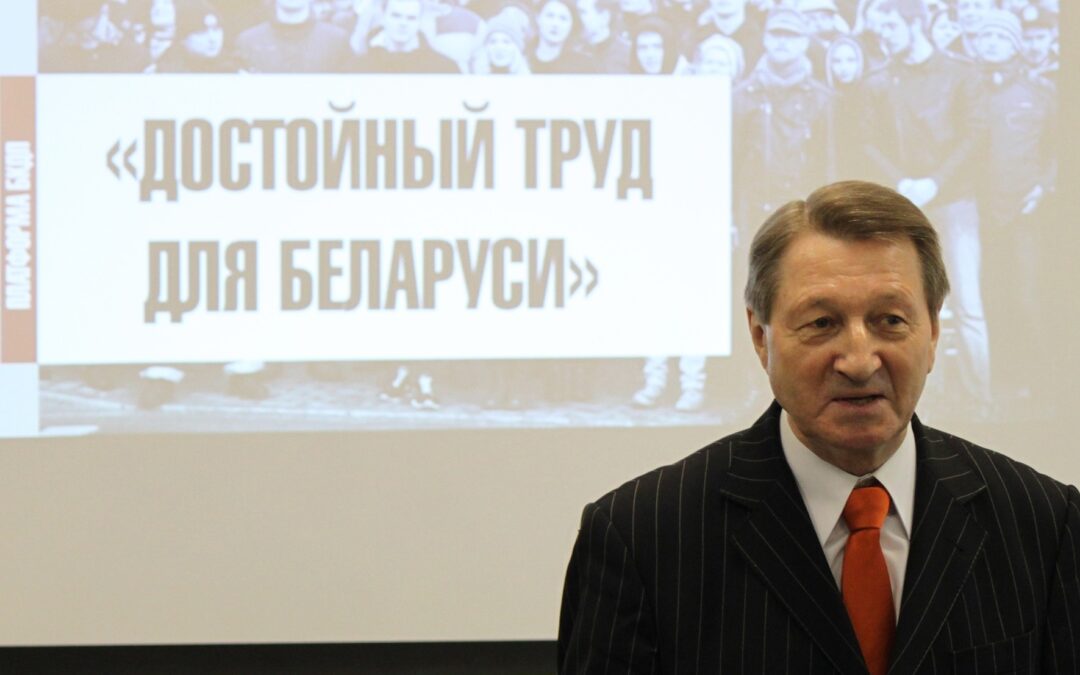
Dec 5, 2022
In the wake of a new wave of prison sentences against union leaders and other activists arrested earlier this year, new Belarus worker rights organization Salidarnast is tracking and disseminating updates on union political prisoners’ legal cases, and providing other worker rights news.
Belarusian Congress of Democratic Trade Unions (BKDP) President Aliaksandr Yarashuk, jailed since April and facing 14 years in prison, was elected in absentia to an ITUC vice-presidency at the organization’s 5th World Congress last month, reports Salidarnast.
Other updates include:
- Extraordinary mistreatment of two jailed union leaders, Leanid Sudalenka and Volha Brytsikava, for which Brytsikava reportedly started a hunger strike on November 8 and was released last week after having spent more than 105 days behind bars this year–including 75 consecutive days in the spring
- Continuation of a ten-person trial associated with worker organization Rabochy Rukh for which the accused are facing prison sentences of up to 15 years for high treason, among other charges
- Grodno Azot fertilizer factory worker and chairperson of the independent trade union there, Andrei Khanevich, whose phone was tapped by Belarusian special service, sentenced to five years in prison for speaking with a BelSat TV reporter
- Belarusian Independent Trade Union (BNP) Vice Chairperson and Chairperson of the Local Trade Union at Belaruskali fertilizer factory, Aliaksandr Mishuk—detained since May—sentenced to two and a half years’ imprisonment
- Free Trade Union of Metalworkers (SPM) Deputy for Organizational Work Yanina Malash—mother of a minor child and detained since April—sentenced to one and a half years’ imprisonment
- Vital Chychmarou, a former engineer fired in 2020 for trade union activities and manager of an SPM organization, sentenced to three years of home confinement
- Free Trade Union of Metalworkers (SPM) Trade Union Council Secretary Mikhail Hromau—detained since April—sentenced to two and a half years of home confinement
- Genadz Bedzeneu, who attempted to start a local union for Polotsk stall market workers, arrested.
Salidarnast is filling an information void created after the Lukashenko government in July forcibly shut down the BDKP and its affiliates, compounded by the detention of dozens of journalists and media workers with other civil society defenders. The number of political prisoners in Belarus stood at almost 1,500 in November, reports the European Federation of Journalists (EFJ); up from 1,000 in February. The Belarus Supreme Court in July dissolved the BKDP and its four affiliates: BNP, the Union of Radio and Electronics Workers (REP), Free Trade Union of Belarus (SPB) and SPM.
Salidarnast on December 1 flagged the arrest of at least five people at the Miory steel plant, warning of imprisonment risk for up to ten thousand people who contributed to the “Black Book of Belarus” which identified riot police.
“Despite the destruction of the independent trade union movement, workers in Belarus remain the force which can resist the dictatorship,” says Salidarnast.
The repression and eventual dismantling of the independent Belarus union movement began after hundreds of thousands of people, often led by union members , many of them women, took to the streets in 2020 to protest elections in which President Alexander Lukashenko declared himself winner in a landslide victory amid widespread allegations of fraud. The BKDP—the first Belarus union to be independent of government influence in the post-Soviet era—was founded 29 years ago and has been a member of the International Trade Union Confederation (ITUC) since 2003.
Hear more about workers’ fight for freedom by listening to a Solidarity Center podcast interview in which now-imprisoned BDKP Vice President Sergey Antusevich in 2021 spoke passionately about workers taking to the streets in defense of democracy. Antusevich has been jailed pending trial since April 2022.
(You can support jailed Belarusian union leaders—take action here).
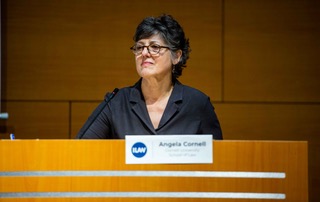
Oct 9, 2022
As the world witnesses some of the greatest challenges to democratic governments since the 1930s, unions offer a strong and essential counter to the trend, according to Cornell University Professor Angela Cornell.
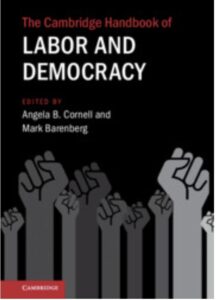 “Many studies show that organized labor has played critical role in developing and defending democracy. The organized working class was the primary carrier of democracy,” Cornell said today at the International Lawyers Assisting Workers Network (ILAW) Conference opening plenary.
“Many studies show that organized labor has played critical role in developing and defending democracy. The organized working class was the primary carrier of democracy,” Cornell said today at the International Lawyers Assisting Workers Network (ILAW) Conference opening plenary.
Cornell, co-editor of The Cambridge Handbook of Labor and Democracy, along with several book contributors, opened the Conference’s third and final day with a discussion of the handbook, an interdisciplinary and cross-regional anthology. (Hear Cornell and ILAW Board member Mery Laura Perdomo discuss unions and democracy on a recent Solidarity Center Podcast.)
More than 130 labor lawyers from 42 countries meeting October 7–9 also focused their final day on developing plans for Network’s coming years.
The Solidarity Center launched the ILAW Network in December 2018 as a global hub for worker rights lawyers to facilitate innovative litigation, help spread the adoption of pro-worker legislation and defeat anti-worker laws.
Unions Fuel Democracy
More than one quarter of the world’s population now live under democratically backsliding governments, including some of the world’s largest democracies.
Cornell listed the ways in which unions fuel democracy, including by providing a counterviling role to corporate power.
Further, said Cornell, “new research on the role of unions and in building solidarity among their members demonstrates the ways in which unions can bridge racial and national divides. Union members are less likely to support extreme views.”
Economic inequality is a destabiizing influence in most countries, Cornell said, and unions decrease inequality.
“Unions have been instrumental in the passsage of labor protections and the social safety net, including social security, minimum wage and overtime, workplace heath and safety and medical leave, among others.”
Unions Build Democracy in Latin America, Africa
Ken Roberts, a professor at Cornell University and book contributor, overviewed how unions have been bulwarks of democracy throughout Latin America.
“Labor has played a central role in trying to restore citizenship rights,” said Roberts. Since the 1960s–1980s, when unions suffered setbacks during military dictatorships and neoliberal reforms that prioritized the interests of the wealthy over working people, the key challenge has been to build broad coalitions, he said.

ITUC General Secretary Sharan Burrow
By joining with other movements, indigineous communities and territorially-based urban community networks, unions have created strong and successful coaltions. Since late 1990s as part of social pushback against neoliberal model, 14 countries have elected progressive governments and labor has been an important part of moving this unprecedented number of elections, he said.
Most recently, unions were part of successful coalitions that elected progressive governments in Honduras and Colombia and are constructing broad democratic fronts against new challenges from ethnonationalist and extreme conservative groups.
In Africa, “more often than not, unions were the only force fighting decolonization,” said Evance Kalula, chair of International Labor Organization (ILO) Committee on Freedom of Association and emeritus prof of law at the University of Capetown. “Formal and informal collaboration between unions as agents of change and nationalist movements.”
Kalula and co-author Chanda Chungu, contributed the chapter on “African Perspectives on Labor Rights as Enhancers of Democratic Governance.”
Julia Lopez Lopez, a professor at the University of Barcelona, described how unions are standing up to corporations that are using the new model of app-based work to exploit transportaton workers.
“The case of transport sector is one of the cases that show unions are trying to create new strategies against market intervention against multinational efforts to liberalize labor rights,” she said.
Lopez recently participated in research projects on precarious work and social rights led by the Working Lives Research Institute.
Closing the Conference, Sharan Burrow, general secretary of the International Trade Union Confederation (ITUC), overviewed the challenges facing workers and their advocates and pointed to recent legal successes as well, including an agreement that the ITUC and ILO achieved with the Qatar government that ensures more rights for migrant workers, including the freedom to leave their jobs and seek alternative employment.








 “Many studies show that organized labor has played critical role in developing and defending democracy. The organized working class was the primary carrier of democracy,” Cornell said today at the International Lawyers Assisting Workers Network (
“Many studies show that organized labor has played critical role in developing and defending democracy. The organized working class was the primary carrier of democracy,” Cornell said today at the International Lawyers Assisting Workers Network (